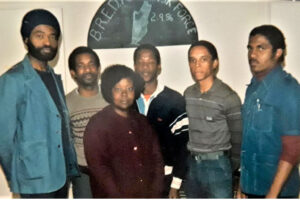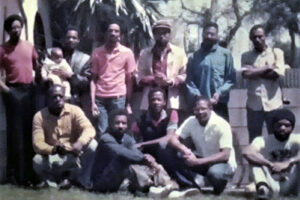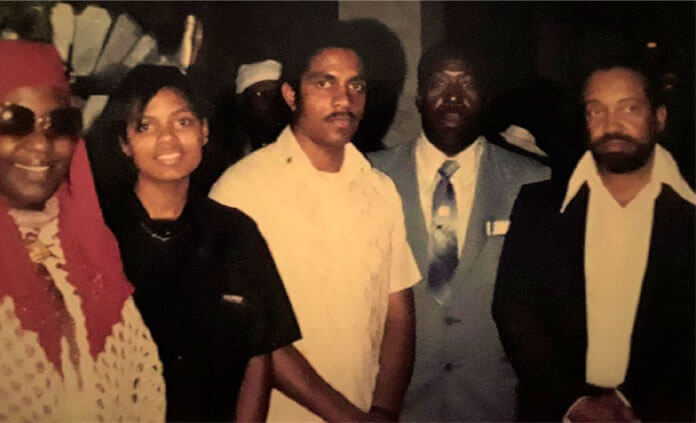When BREDAA became the first and only Belizean diaspora organization to access mass media in the continental United States via its Belize Caribbean Pulse radio show on Pacifica Radio, this achievement brought both adulation and envy, plus new challenges. Until 1989, when Amandala publisher Evan X Hyde launched KREM Radio, Belizeans had known only a single, state-run radio station in the nation. Hence, it was ironic that a diaspora grassroots group made a historic breakthrough by initiating an independent radio program catering to a Belizean and Caribbean audience in April of 1986.
As important and historic as it was, to some degree the radio show became a distraction from BREDAA’s principal objective of advocacy for economic development via land rights, ownership and access through agriculture for Belizeans both at home and abroad. In addition to national agrarian and land redistribution.
In February of 1985, several Belizean grassroots groups in Los Angeles met at Brother Ishmael Shabazz’s residence and agreed to form an alliance which gave birth to BREDAA (Belize Rural Economic Development of Agriculture through Alliance). The groups represented were:
Rudolf Bent (BCA) Belize Cultural Association. (Note this predated the BCA that was reborn with the same name when musicians and artists Patrick Barrow and Pupa Curly started the popular CayeFest music festival that showcased Belizean artists in the mid-1980s in Los Angeles.)
Edgar X Richardson (UBAD) United Black Association for Development
Ishmael Shabazz, Nuri Akbar, Bilal Morris, Hubert Pipersburgh (LAMB) Los Angeles Muslims of Belize
Michael Branche, Orland Bishop (BSU) Black Students Union of LACC
Alexander Vasquez (Winners Organization)
Sister Heidi Tucker, Belizean diaspora grassroots organizer
The name of the new group was suggested by Brother Shabazz and adopted as Belize Rural Economic Development of Agriculture through Alliance (BREDAA). Ishmael Shabazz was central to forging the foundation platform of BREDAA that centered around advocacy of land and agrarian reform in Belize, land rights, land access, and ownership for Belizeans at home and abroad, in addition to agriculture and animal husbandry, industry and international trade as a basis for economic independence.
In 1985 there was no Belizean organization at home and abroad that had as its focus on land redistribution and the issue of absentee foreign land ownership in Belize. There was an emphasis in BREDAA on the youth population and particularly the black urban youth, because by the mid 80’s the rise of gangs, drugs, and violence was emerging as a major social factor in Belize.
Elections were held for officers, and both Nuri Akbar and Rudolf Bent were nominated for the chairmanship. In a general vote of confidence, Nuri Akbar was elected its chairman, Rudolf Bent deputy chair, Bilal Morris public relations, Edgar X Richardson treasurer, and Shabazz secretary.
Initially, I had no desire to be in a leadership position at BREDAA. However, our senior brothers, Shabazz and Edgar X, both formerly officers of UBAD, felt differently, and encouraged and supported me in that direction.

The original membership of BREDAA was a unique mix of older OG’s like Shabazz and Edgar X, who were pioneers in the black militant youth movement of the late 60’s – UBAD, and had established reputations and street credibility. Ishmael Shabazz was an institution in the Belize black political, religious, cultural, and social movement dating back to the early 60’s when he became the first recorded convert to the Nation of Islam teachings introduced to Belize by another legend of the black power movement in Belize, Charles X Eagan, aka Brother Justice, and later Ibrahim Abdullah.
Eagan and Shabazz are credited for launching the first modern NOI community in Belize in 1960 in the village of More Tomorrow. Shabazz was also a founding member of UBAD and played a pivotal role in the organization’s stability. UBAD president Evan X Hyde attributes Shabazz as the glue that held the different factions in UBAD together. He served as the first publisher of the Amandala newspaper, which began as an information organ of UBAD.
Prior to discovering the book “A Crowd Called UBAD,” written by Evan X Hyde, in the Muslim library which was a project of and managed by sister Hanifa Arnold, a former member of UBAD, I knew little or nothing regarding this most important Belizean black conscious youth movement of the late 60s and early 70s until I met Shabazz. Shabazz was a self-educated historian who conducted important research on Belizean land laws and history and was versed in this field. Shabazz served as village chairman for More Tomorrow, ran along with Evan X Hyde in a Belize City Council election in 1971 (in an NIP-UBAD coalition), and he and Hyde had stood trial in the Belize Supreme Court in July of 1970 for the concocted charge of sedition, on which they were both acquitted.
Shabazz also played a pivotal role in securing the property that now houses the Muslim school and Masjid in Belize City, as well as serving as its manager. He was also an efficient mechanic and managed his own business at different periods in Belize. As village chairman, he represented the voiceless villagers who got pushed around by the bureaucrats in Belmopan and struggled to obtain title to their land. He was friendly, dependable, trustworthy, and brilliant. He had a deep love for his people and country and well-liked and was respected by his peers and community.
Edgar X Richardson was an early officer of UBAD in 1969, and he and Shabazz’s relationship went back decades as activists in Belize. Shabazz was responsible for introducing Brother Edgar X to the younger members of BREDAA, who had no idea who he was. Edgar X Richardson is the younger brother of the legendary political pioneer, Leigh Richardson, who worked along with Philip Goldson, George Price, and others in the original People’s United Party (PUP).
Edgar X was a smooth brother who proved to be extremely dependable and principled. I have never witnessed Edgar X losing his temper even when he was dishing out admonishments. Since I had no car at the time, Brother Edgar X committed himself to picking me up for each BREDAA meeting and he never once failed in that assignment.
Whenever BREDAA had events, both Edgar X and Shabazz were always punctual for meetings and assignments and were the steady in-house advisors of BREDAA. They were trusted soldiers who formed a solid foundation for the new group. Their input, experience, and deliberations were critical in deciding BREDAA policy decisions.
Brother Rudolf Bent is a smart and intelligent brother who is one of Belize’s finest artists. His work of arts are cultural, political, and radical in content. A mild personality who expresses his mind and teaches via his art in charcoal and oil painting and is a master in both fields. His artwork has been displayed in the African American Museum in Los Angeles and other art festivals in and around Southern California. Bent, at heart, is a grassroots activist driven to preserve the Black culture in Belize and the African diaspora. A dedicated family man who excelled in this role with pride and confidence.
Accentuating the extricable link between the student movement and BREDAA was the dynamic south American A-team of Michael Branche and Orland Bishop, both natives of Guyana and activist students and members of the militant Black Student Union at Los Angeles City College (LACC). Impressed with their personalities, intelligence, political consciousness, and zeal, I invited them to become members of BREDAA, an invitation they accepted. Branche was the student president of the vocal and energetic BSU and Bishop was the vice-president of the Los Angeles City College student government and represented the BSU on the statewide African Black Statewide Student Alliance (ABSSA). Orland Bishop is a calm, calculated, brilliant, and consummate diplomat. They brought a level of energy and intellect that immediately reverberated and increased BREDAA’s momentum. Branche and Bishop were able to connect with the cultural vibrations of Caribbean politics and express the similarities between Belize and Guyana. They also contributed to the Pan Caribbean outlook of the organization as we embarked upon addressing issues relevant to black people of our region.
Nuri Akbar, Bilal Morris, and Hubert Pipersburgh were all members of the Los Angeles Muslims of Belize (LAMB), whose leader was Ishmael Shabazz. LAMB started in 1983 and was an organization of Belizean Muslims who lived in the Los Angeles area and would meet on a regular basis. LAMB members included Shabazz as Amir, Nuri Akbar, Sis Darlene Jones, Sis Shahida Shabazz, Sis Jane Hasan, Saeed Rasool, Bilal Morris, and Michael Dominguez.
LAMB at the time mostly aligned with Imam W. D. Muhammad, a son of the Hon. Elijah Muhammad who became the leader of the Nation of Islam after Elijah’s death. Muhammad had changed direction and the name of the NOI (Nation of Islam) to the American Muslim Mission, and he embraced traditional Arabized Islamic practice. This alignment would change dramatically as Minister Louis Farrakhan exploded on the American landscape with the rebirth of the Nation of Islam in the early 1980’s.
This group’s main outreach project that became popular within the Belizean community in Los Angeles was the monthly publication called the BELIZEAN FOCUS, published in January of 1984. The newspaper focused on stories relevant to Belize both at home and abroad and highlighted outstanding Belizean personalities in the diaspora in politics, culture, academics, and sports, in addition to news and stories on Belize both domestic and international. Indeed, the Belizean Focus became the forerunner to the Belize Caribbean Pulse radio program.
The editor of the BF was Bilal Morris; Nuri Akbar assisted, with contributing writers Ishmael Shabazz, Nuri Akbar, Saeed Rasool, and my niece typist, Darlene Jones, and Lillette Barkley Waite. It is important to note that Barkley Waite was a former UBAD-er introduced to the paper by Shabazz, who worked with her in the UBAD days in Belize.
Hubert Pipersburgh was initially New York-based, but moved to LA shortly thereafter and joined BREDAA. Pipersburgh’s relationship with Nuri Akbar and Bilal Morris goes back to childhood, and Akbar and Pipersburgh, who were members of the Islamic Mission in Belize before they migrated to the U.S., became like brothers. It was Akbar’s visit to NY in early 1983 that convinced Pipersburgh to relocate to LA the following year. He was brilliant, a magnetic personality who always greeted you with a big smile. Hubert could be counted upon to bring high energy to meetings and was a key contributor. Pipersburgh overcame many challenges he faced when he made the daring move from NY to LA, but his perseverance and his brotherhood bond within our small circle eventually led him to the University of Southern California (USC).

Front row – (L to R) Brother Shabazz, Rudolf Bent, Michael Branche, Saeed Rasool, Edgar X Richardson
In the fall of 1983, Bilal Morris (formerly Denton Morris) and I met on a bus in LA while on my way to school. I discovered we were heading in the same direction and both attending the same school, Los Angeles City College. Morris had this unassuming and reserved personality, but we had known each other as children growing up in the same neighborhood in Belize City. Morris would become one of my closest friends and associates and a foundation member of BREDAA. Shortly thereafter I invited Morris to the Los Angeles Muslims of Belize (LAMB) meetings that were hosted by Bro Shabazz and his wife, Sis Shahida, at their home. Eventually, Morris embraced the Islamic faith and became a Muslim, adopted the name “Bilal,” and went on to become a dedicated practitioner and activist ever since. He is a prolific writer, documentarian, radio producer, music promoter, businessman, educator, family man and studied at UCLA’s graduate school of communication. His role and contribution to BREDAA would become monumental as the organization moved into mass media broadcasting at Pacifica radio in the decades of the ’80s and ’90s.
Bro Alexander Vasquez of course was well known by Belizeans as the great athlete that he was and champion of Belize’s most prestigious sporting event, the annual Cross Country cycling race, in 1980. A calm and soft-spoken and well-mannered brother, Vasquez represented a group called “Winners,” whose goal was to sponsor athletes at home and abroad. He had a genuine interest in the BREDAA agenda of empowerment of Belizeans youth by having access to land ownership and economic development via agriculture with an emphasis upon the urban youth population. He was instrumental in adopting the foundation platform document in the formation of BREDAA.
Heidi Tucker is the sister-in-law of Bro Shabazz and was a founding member of BREDAA. Tucker is a well-known and established personality in the Belizean circles in Los Angeles. Her home and yard was a popular spot for senior Belizean gatherings. Tucker is a leader and influencer in the local lodge and church where many Belizeans are members. Tucker played a prominent role in grassroots outreach by the organization. She was a critical link between the largely young BREDAA members and the older generations of Belizeans who migrated to southern California from the ’60s and ’70s. She also gave an important female voice to the discussions until other females arrived to join the ranks. These included Sis Iris Sanker, Dr. Pam Reyes, Becky Castillo, Kay Simon, Francine Encalada, Therese Smith, etc.

